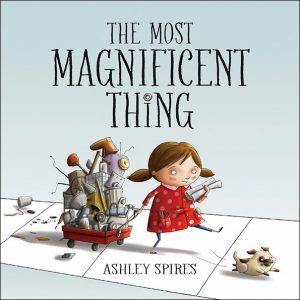As a picture book lover of the genus hoarder, I advocate for classroom read alouds by finding curricular tie-ins to make reading authentic children’s literature an everyday part of the Montessori experience; but, honestly, some picture books are so fantastic (or in this case, magnificent), they secure their place in the classroom, no strings attached. They just deserve to be read aloud again and again. . . . period!
Such is the case with . . .
 The Most Magnificent Thing written and illustrated by Ashley Spires
The Most Magnificent Thing written and illustrated by Ashley Spires
Publisher: Kids Can Press (2014)
Here’s the story – One day a little girl has a wonderful idea. With the help of her canine assistant, “she is going to make the most MAGNIFICENT thing! She knows just how it will look. She knows just how it will work. All she has to do is make it, and she makes things all the time. Easy-peasy!” But making her magnificent thing is anything but easy, and the girl tries and fails, repeatedly. Eventually, she gets really, really mad. She is so mad, in fact, that she quits. But after her dog convinces her to take a walk, she comes back to her project with renewed enthusiasm and manages to get it just right.
This humorous book offers a perfect example of the rewards of perseverance and hard work, and the importance of a growth mindset. There is value in failure, and in this story the failure is continual and incredibly frustrating. The girl’s frustration and anger are vividly depicted in the detailed art, and the story offers good options for dealing honestly with these feelings, while at the same time reassuring children that it’s okay to make mistakes.
The little girl is unnamed; author/illustrator, Ashley Spires, notes that the story is not about a character but an experience. She wanted to ensure that readers would identify with the feelings the child is having and see themselves in the girl’s struggle, not the girl.  Spires shares her own frustrations with illustrating as she explains on the copyright page, “the artwork in this book was rendered digitally with lots of practice, two hissy fits and one all-out tantrum.”
Spires shares her own frustrations with illustrating as she explains on the copyright page, “the artwork in this book was rendered digitally with lots of practice, two hissy fits and one all-out tantrum.”
Montessorians will recognize the parallels this story makes to our own pedagogy. Children are challenged in our multi-age environments, but are given time to practice and practice some more. Effort, not talent, is honored; and mistakes are viewed as opportunities to learn and grow everyday.
If I’ve left you with any doubts about the value of this read aloud, let me add a few perks, compliments of the talent that is Ashley Spires:
Read this book aloud . . .
- for that red wagon pilled with mysterious supplies that will invite a host of predictions
- for the trifectas of precise verbs – she doesn’t just make her magnificent thing – she “tinkers and hammers and measures, smoothes and wrenches and fiddles, twists and tweaks and fastens”
- in honor of pronouns – all of THEM – THEY enjoy quite a romp through this book!
- for the wager of who will be the first to notice the pug’s pee splash – no spoiler alerts . . . wait for it!
- for that dark scribble above the little girl’s head – a universal symbol of frustration that unites us all under the mantra, “I’ve felt like that.”
So, go, gather your children, and read (or re-read) this book! Enjoy it and embrace it for every child who seeks challenge, works hard, makes mistakes, then gives it another go.
Other great read alouds that push the growth mindset: The Carrot Seed by Ruth Krauss; Everyone Can Learn to Ride a Bicycle by Chris Raschka
